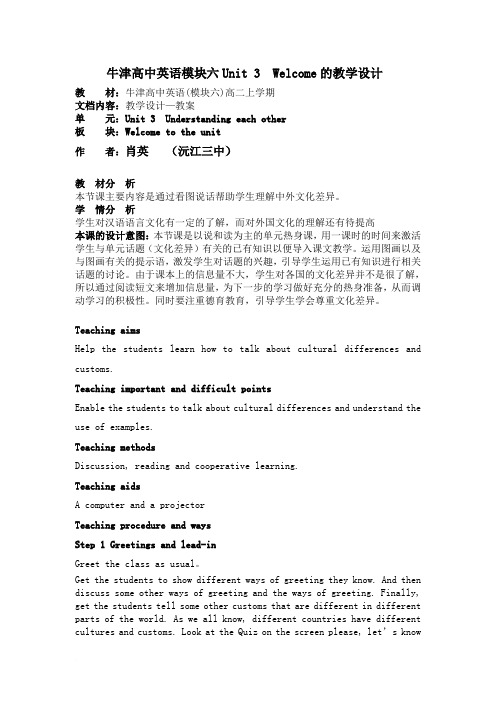牛津高中英语模块六Unit 3
- 格式:ppt
- 大小:3.86 MB
- 文档页数:73


牛津高中英语模块六Unit 3 Welcome的教学设计教材:牛津高中英语(模块六)高二上学期文档内容:教学设计—教案单元:Unit 3 Understanding each other板块:Welcome to the unit作者:肖英(沅江三中)教材分析本节课主要内容是通过看图说话帮助学生理解中外文化差异。
学情分析学生对汉语语言文化有一定的了解,而对外国文化的理解还有待提高本课的设计意图:本节课是以说和读为主的单元热身课,用一课时的时间来激活学生与单元话题(文化差异)有关的已有知识以便导入课文教学。
运用图画以及与图画有关的提示语,激发学生对话题的兴趣,引导学生运用已有知识进行相关话题的讨论。
由于课本上的信息量不大,学生对各国的文化差异并不是很了解,所以通过阅读短文来增加信息量,为下一步的学习做好充分的热身准备,从而调动学习的积极性。
同时要注重德育教育,引导学生学会尊重文化差异。
Teaching aimsHelp the students learn how to talk about cultural differences and customs.Teaching important and difficult pointsEnable the students to talk about cultural differences and understand the use of examples.Teaching methodsDiscussion, reading and cooperative learning.Teaching aidsA computer and a projectorTeaching procedure and waysStep 1 Greetings and lead-inGreet the class as usual。
Get the students to show different ways of greeting they know. And then discuss some other ways of greeting and the ways of greeting. Finally, get the students tell some other customs that are different in different parts of the world. As we all know, different countries have different cultures and customs. Look at the Quiz on the screen please, let’s knowmore about cultural differences in different countries.1) In Western count ries, it’s unusual to give tips. (No)2) Westerners tend to avoid using13. (Yes)3) Nodding your head up and down always means yes. (No)4) Usually, one should never give a clock as a gift in China. (Yes)5) Never point to anything with your foot in Vietnam. (Yes)6) You can pass something to an older person with one hand in Korea.(No)7) In Canada, it’s OK to arrive early if you are invited to someone’shouse? (No)Write the following names of countries on the blackboard.China, Japan, USA, Thailand, South America, the Middle East, Dutch (设计意图)本环节先从单元话题入手,让学生从简单的QUIZ中了解各国在日常生活中有哪些基本的文化差异,不至于在以后与外国人打交道产生误解,造成尴尬的局面。


牛津高中英语模块六Unit 3 Welcome的教学设计教材:牛津高中英语(模块六)高二上学期文档内容:教学设计—教案单元:Unit 3 Understanding each other板块:Welcome to the unit作者:肖英(沅江三中)教材分析本节课主要内容是通过看图说话帮助学生理解中外文化差异。
学情分析学生对汉语语言文化有一定的了解,而对外国文化的理解还有待提高本课的设计意图:本节课是以说和读为主的单元热身课,用一课时的时间来激活学生与单元话题(文化差异)有关的已有知识以便导入课文教学。
运用图画以及与图画有关的提示语,激发学生对话题的兴趣,引导学生运用已有知识进行相关话题的讨论。
由于课本上的信息量不大,学生对各国的文化差异并不是很了解,所以通过阅读短文来增加信息量,为下一步的学习做好充分的热身准备,从而调动学习的积极性。
同时要注重德育教育,引导学生学会尊重文化差异。
Teaching aimsHelp the students learn how to talk about cultural differences and customs.Teaching important and difficult pointsEnable the students to talk about cultural differences and understand the use of examples.Teaching methodsDiscussion, reading and cooperative learning.Teaching aidsA computer and a projectorTeaching procedure and waysStep 1 Greetings and lead-inGreet the class as usual。
Get the students to show different ways of greeting they know. And then discuss some other ways of greeting and the ways of greeting. Finally, get the students tell some other customs that are different in different parts of the world. As we all know, different countries have different cultures and customs. Look at the Quiz on the screen please, let’s knowmore about cultural differences in different countries.1) In Western count ries, it’s unusual to give tips. (No)2) Westerners tend to avoid using13. (Yes)3) Nodding your head up and down always means yes. (No)4) Usually, one should never give a clock as a gift in China. (Yes)5) Never point to anything with your foot in Vietnam. (Yes)6) You can pass something to an older person with one hand in Korea.(No)7) In Canada, it’s OK to arrive early if you are invited to someone’shouse? (No)Write the following names of countries on the blackboard.China, Japan, USA, Thailand, South America, the Middle East, Dutch (设计意图)本环节先从单元话题入手,让学生从简单的QUIZ中了解各国在日常生活中有哪些基本的文化差异,不至于在以后与外国人打交道产生误解,造成尴尬的局面。


模块六Unit Three Understanding each other一. 根据首字母或汉语提示完成句子1. It is estimated that about 11.500 athletes from all over the world will p________in the 2008 Beijing Olympic Games.2. When you come to a new country, special attention should be paid to cultural d____3. The British people love to decorate Christmas trees and hang up evergreen branches onChristmas Day while Chinese people tend to have a large banquet in c________ of Spring Festival.4. When planting flowers, try to choose n____ species. They will be easier to survive.5. Dr. Smith is from Australia. It’s no wonder he speaks with a strong Australian a_________.6. The two major parts in a research project include gathering data and a _____ data.7. The cold is u___________. Yesterday it was 29℃,but today the temperature drops to only 10℃.8. He had some difficulty a______________ himself to the new conditions on his first visit to London last fall.9. If you want any f____________ explanation, you’d better ask the manager.10. Mary decided to explore in the forest on her own. Yet her parents were both c___________ for her safety.11. It can be quite ________________(令人尴尬的)to take a stranger for your friend and sayhello to him or her while he or she makes no response.12. Many cars________(属于)to local people were destroyed in the storm last month.13. In England, it isn’t the Queen reigns but elected representatives of the people that_____________(统治)the country.14. As____________(少数)voted in favor of the new law, it wasn’t passed at last.15. When the bomb exploded, the spot was in a terrible mess, so nobody could give the report a full____________(叙述)of it.二. 根据课文完成短文People can often experience ____1_____differences. For example, the Americans are ____2____talking about Thanksgiving Day and the huge turkey they eat. They get quite excited whenever it ____3____to this topic. However, some British people don’t even know what Thanksgiving is held in ____4____of .It is OK for the British to open the presents as soon as they receive them. But it is____5____ to do so in the East. Even though there are ____6____between wedding traditions in the west, there are also differences between different Western countries. In the UK, the guests are ____7____to give presents to the newly-weds, but in Italy, the newly-weds are supposed to give their guests presents. Besides, in many countries, people point ____8____their first finger. But people from Brunei use their thumb____9____. Foreigners have to ____10____themselves to that, or it will be quite rude.So, it is a good way to learn about cultural differences to understand more about each other.[考点透视]sb / sth. 期待、预料to do sth 期望做某事1. expect +n. that –clauseas expected 如同期望中那样than expected 比期望中要…You arrived earlier than◎expect vt. 本意为“期望”或“预料”,常含有知道某事即将发生之意,它也可引申为汉语的“等待”。